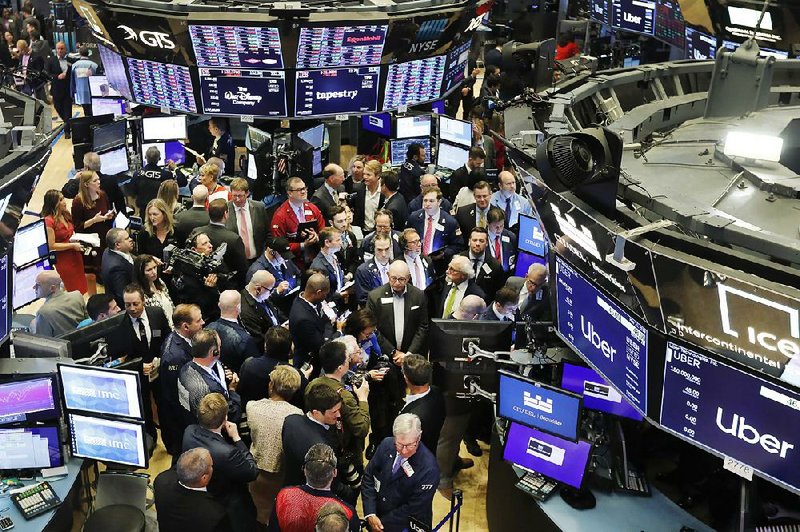Uber's first day of trading on the New York Stock Exchange began with a drop from its initial public offering price of $45, and its stock closed Friday at $41.57, down 7.6%. While Uber raised $8.1 billion, and its initial valuation of $82.4 billion was among the highest for a company going public in the United States, that was far less lofty than had been anticipated before it began pitching its shares to investors.
Its stock tumble, which was unusual for what are typically carefully calibrated offerings, pointed to miscalculations by the Wall Street banks that had taken Uber public and signified a disappointment for Dara Khosrowshahi, the chief executive, who was hired partly to steer the company through a successful initial public offering.
Few companies of Uber's stature have stumbled so badly out of the gate as a public company. Other well-known tech brands, from Facebook to Snap to Alibaba to Lyft, all rose on their initial trade. Since 2000, only 18 companies valued at more than $1 billion and listing on American exchanges have opened below their initial public offering price. On average, tech stocks have jumped -- or "popped," in Wall Street parlance -- 21% on their first day of trading over the past 24 years, according to Dealogic.
Uber and its bankers appeared to have misjudged how much investors would embrace the company's stock. Last year, bankers said Uber could be valued at $120 billion upon its initial public offering, which would have made it the biggest American company ever to go public on an American stock exchange.
But that number declined in recent weeks over questions about whether the deeply unprofitable company could make money. That was compounded by the performance of rival Lyft, which enjoyed a first-day surge when it went public in March but quickly fell below its initial price, and which posted a big first-quarter loss this week.
Uber's debut also was marred by a volatile stock market. On Friday, the S&P 500 index was on track for its fifth consecutive daily decline and its worst weekly performance of the year as trade tensions worsened between the United States and China. But even as the index rallied to end the day higher, Uber's stock continued to fall.
For other tech companies moving toward the stock market -- including the workplace collaboration company Slack and the fitness-gear maker Peloton -- Uber's initial public offering is a warning that fast-growing but unprofitable enterprises may not be snapped up by investors as they have been in the past.
"This is going to cause some more caution in the IPO market," said Matt Kennedy, a market strategist at Renaissance Capital, which manages exchange-traded funds that focus on initial public offerings. "Silicon Valley's mantra of growth at all costs just does not fly on Wall Street."
At the New York Stock Exchange, where Uber executives gathered Friday for the traditional bell-ringing ceremony to celebrate an initial offering, the mood changed swiftly. What began as a buzzy morning shifted to anxiety as the numbers on the monitors that line the exchange floor began sinking -- $44, $43 and finally $42, which was what Uber's stock eventually opened at. The chatter dwindled, and voices hushed.
In an interview later in a small room off the exchange floor, Khosrowshahi said: "I think we came public on a tough day, and a tough week. But this is an incredibly resilient company."
The first day of trading does not necessarily indicate how a company's shares will perform over the long term. Of the 18 companies that opened below their initial public offering price since 2000, eight traded higher a month later and six a year later, according to Dealogic.
Uber is the biggest company to emerge from an age of smartphone apps, which began just over a decade ago after Apple introduced the iPhone in 2007. While other companies have adapted their businesses to mobile devices, Uber was a mobile native, letting people hail rides with the touch of a button on their smartphones.
Along the way, it changed how people move around, allowing millions with no taxi licenses to become drivers without taking them on as full-time employees, an arrangement, known as "gig work," that has led to labor protests and lawsuits.
Uber, founded by Garrett Camp and Travis Kalanick in 2009, began as a high-end ride-for-hire service for the Silicon Valley elite. The app seized on the iPhone, which had an accelerometer, an electronic instrument used to measure changes in velocity, and later GPS, which Uber used to help both drivers and riders navigate the world around them.
Business on 05/11/2019
